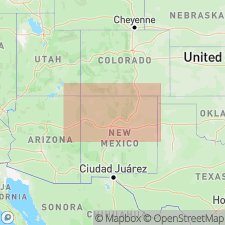- Usage in publication:
-
- Montezuma Valley Member
- Modifications:
-
- Original reference
- Dominant lithology:
-
- Shale
- AAPG geologic province:
-
- Paradox basin
- San Juan basin
Leckie, R.M., Kirkland, J.I., and Elder, W.P., 1997, Stratigraphic framework and correlation of a principal reference section of the Mancos Shale (Upper Cretaceous), Mesa Verde, Colorado: New Mexico Geological Society Field Conference Guidebook, no. 48, p. 163-216.
Summary:
Pg. 166 (fig. 5), 167 (table 2), 168 (fig. 6), 176-177, 185. Montezuma Valley Member of Mancos Shale. Gray, slightly silty to slightly sandy calcareous shale. Contains numerous septarian concretions and several bentonite beds (notably in basal 2 m). In Mesa Verde reference section of Mancos Shale = interval 184.2 to 200.4 m (units MV305- MV329); thickness 16.2 m. Rocks previously assigned to upper part of Carlile Shale Member of Mancos Shale. Overlies Juana Lopez Member of Mancos Shale. Disconformably underlies Smoky Hill Member of the Mancos (contact can be observed near base of west-facing slope just south of aqueduct service road in NE/4 SE/4 sec. 31, T. 36 N., R. 14 W.). Exposed on slopes and in arroyos beneath the more resistant marlstones and calcareous shales of the Smoky Hill. In the subsurface, it can be recognized as the interval between the high-amplitude Juana Lopez geophysical log signature and the lower gamma-ray/higher resistivity values of the lower part of Smoky Hill. Correlates with several units, notably upper part of D-Cross Tongue of the Mancos in southern and southwestern parts of the San Juan Basin. Fossils [listed and illustrated]. Age is late Turonian; spans from ammonite SCAPHITES WHITFIELDI zone into PRIONOCYCLUS QUADRATUS zone.
Type section: exposed on both sides of the Mesa Verde National Park aqueduct and along an unimproved service road, in SE/4 sec. 31, T. 36 N., R. 14 W., [approx. Lat. 37 deg. 19 min. 52 sec. N., Long. 108 deg. 25 min. 56 sec. W.], near northern entrance to Mesa Verde National Park, Point Lookout 7.5-min quadrangle, Montezuma Co., southwestern CO. [Named from Montezuma Valley, north of Mesa Verde National Park.]
[Additional locality information from USGS historical topographic map collection TopoView, accessed April 20, 2023.]
Source: Publication.

- Usage in publication:
-
- Montezuma Valley Member*
- Modifications:
-
- Adopted
- Areal extent
- AAPG geologic province:
-
- Paradox basin
- San Juan basin
Summary:
Sheet 1 (east-central Arizona to Pagosa Springs, Colorado). Montezuma Valley Member of Mancos Shale (Leckie and others, 1997). Identified in subsurface (borehole logs 26, 27) of Durango-Pagosa Springs region, northeastern San Juan Basin and Archuleta Arch, southwestern Colorado. Included in Cretaceous "dominantly marine shale and siltstone" facies. Overlies Juana Lopez Member, unconformably underlies Smoky Hill Member, and with uncertainty, partly equivalent to Fort Hays Limestone Member; all of Mancos Shale. Age is Late Cretaceous [late Turonian].
Source: Publication.
For more information, please contact Nancy Stamm, Geologic Names Committee Secretary.
Asterisk (*) indicates published by U.S. Geological Survey authors.
"No current usage" (†) implies that a name has been abandoned or has fallen into disuse. Former usage and, if known, replacement name given in parentheses ( ).
Slash (/) indicates name conflicts with nomenclatural guidelines (CSN, 1933; ACSN, 1961, 1970; NACSN, 1983, 2005, 2021). May be explained within brackets ([ ]).

